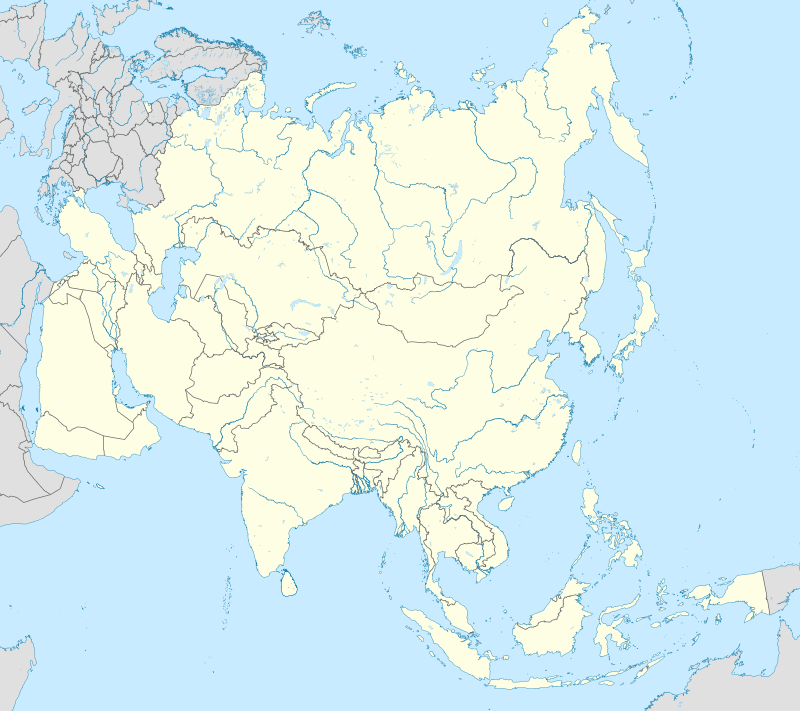The FIS Ski Jumping World Cup is the world's highest level of ski jumping and the FIS Ski Flying World Cup as the subdivisional part of the competition. It was founded by Torbjørn Yggeseth for the 1979/80 season and organized by the International Ski Federation. Ladies began competing during the 2011/12 season.[1]
The rounds are hosted primarily in Europe, with regular stops in Japan and rarely in North America. These have been hosted in 20 different countries around the world for both men and ladies: Austria, Bosnia, Canada, Czech Republic, Finland, France, Germany, Italy, Japan, Kazakhstan, Norway, Poland, Russia, Romania, Slovakia, Slovenia, South Korea, Sweden, Switzerland and the United States.[2][nb 1]
Summer Grand Prix is the top level summer competition on plastic. The lower competitive circuits include the Continental Cup, the FIS Cup, the FIS Race and the Alpen Cup.
Global map of all world cup hosts
All 64 locations around the globe which have been hosting world cup events for men (57) and ladies (20) at least one time in the history of this competition. Pyeongchang is the next new upcoming host in 2017.
FIS Ski Jumping World Cup (Europe) |
|
FIS Ski Jumping World Cup (Asia) |
FIS Ski Jumping World Cup (North America) |
|
 Four Hills Tournament (1979– )
Four Hills Tournament (1979– )
 Nordic Tour (1997–2010); Raw Air (2017– )
Nordic Tour (1997–2010); Raw Air (2017– )
 Swiss Tour (1980–1992)
Swiss Tour (1980–1992)
 Bohemia Tour (1981–1994)
Bohemia Tour (1981–1994)
 Nordic Tour (1997–2010)
Nordic Tour (1997–2010)
 FIS Team Tour (Oberstdorf included, 2009–2013)
FIS Team Tour (Oberstdorf included, 2009–2013)
Scoring system
Each season consists of 25–30 competitions, usually two competitions on the same hill during a weekend. One competition consists of a qualifying round, first round and second round. The top 10 jumpers in FIS ranking qualify directly to the first round, while the rest of the jumpers fight for the remaining 40 spots. The top 30 men in the first round advance to the second round, which is held in reverse order, so the best jumper in the first round jumps last. The aggregate score in the first and second rounds determine the competition results. The top 30 are awarded World Cup points. The winner gets 100 points while number 30 receives 1 point. At team events only top 8 receive points.
Men's team
Men's standings
The table below shows the three highest ranked jumpers each year.
Ski Flying
|
Ski Jumping (JP) Cup
*This additional title was awarded five times from 1996 to 2000 for the best individual normal and large hill results only, not
including ski flying. The winner thus received a smaller version of the Crystal Globe trophy. It must be noted that this title
was distinct from the overall World Cup, which included ski flying results.
|
Tournaments
There are other tournaments as part of the World Cup:
K.O.P. International Ski Flying Week
Nordic Tournament
Raw Air
|
Swiss Tournament
Bohemia Tournament
FIS Team Tour
|
Ladies' standings
Titles
Overall
|
Ski Flying
Ski Jumping (JP) Cup
|
Men's general statistics
still active career
Wins
As of 26 March 2017
|
Podiums
As of 26 March 2017
Top ten appearances
As of 26 March 2017
|
Ski flying section
Wins
As of 26 March 2017
|
Podiums
As of 26 March 2017
Top ten appearances
As of 26 March 2017
|
Ladies' statistics
retired female ski jumper
As of 12 March 2017
Wins
Wins per season
|
Podiums
Podiums per season
|
Consecutive wins
Average points per season
|
|
Team events
Individual team wins
As of 22 February 2016
|
Men's team
As of 18 March 2017
|
Mixed
As of 6 December 2013
|
|
Various
As of 26 March 2017
Youngest winners
|
Youngest on podium
|
Oldest winners
|
|
Oldest on podium
|
Wins per season
|
Podiums per season
|
|
Most points per season
|
Highest overall advantage
|
Average points per season
|
|
Consecutive wins
|
Overall leader by total events
Individual starts
|
Consecutive podiums
Ski flying leader by total events
|
|
World Cup winners by nations
The table below lists those nations which have won at least one World Cup race (current as of 26 March 2017).
Men
those countries no longer exist
- after 925 individual events (11 double wins).
|
Ladies
- after 96 individual events (2 double wins).
Mixed
|
Men's team
- after 87 men's team events.
|
|
Hosts
Men
|
Men's team
Ladies
Mixed
|
Timeline calendar
Last updated: 26 March 2017
World Cup all-time records
Double wins
Men
Ladies
Key people
Torbjørn Yggeseth was a founder and a leader of this competition for the first 13 seasons. A new function called Race Director was introduced by International Ski Federation in 1992/93 with its first president Walter Hofer. Before that season this function didn't exist.[3] In the premiere Ladies 2011/12 World Cup season Chika Yoshida was entitled as World Cup Coordinator, but since the season 2012/13 Yoshida is called Race Director.
Notes
- ↑ Note that the rounds hosted in Bosnia and Herzegovina and Slovakia were held when the countries were still part of Yugoslavia and Czechoslovakia respectively.
References
External links
|
|---|
| Seasons | |
|---|
| Men's winners | |
|---|
| Ladies' winners | |
|---|
| Nations Cup (men) | |
|---|
| Nations Cup (ladies) | |
|---|
|

![]() Four Hills Tournament (1979– )
Four Hills Tournament (1979– )
![]() Nordic Tour (1997–2010); Raw Air (2017– )
Nordic Tour (1997–2010); Raw Air (2017– )
![]() Swiss Tour (1980–1992)
Swiss Tour (1980–1992)
![]() Bohemia Tour (1981–1994)
Bohemia Tour (1981–1994)
![]() Nordic Tour (1997–2010)
Nordic Tour (1997–2010)
![]() FIS Team Tour (Oberstdorf included, 2009–2013)
FIS Team Tour (Oberstdorf included, 2009–2013)

